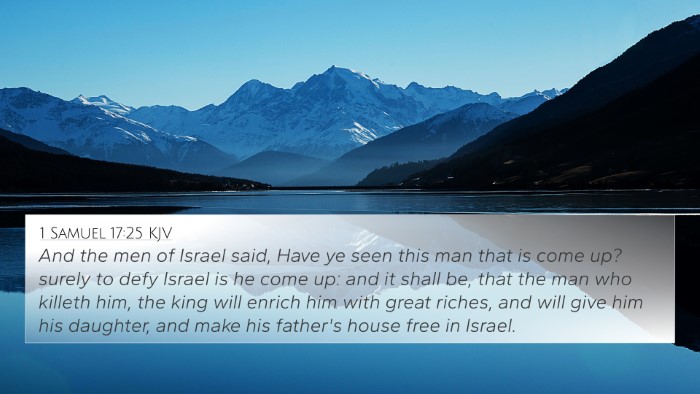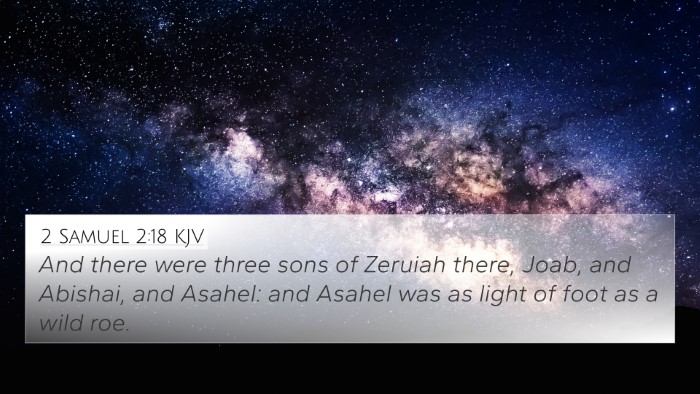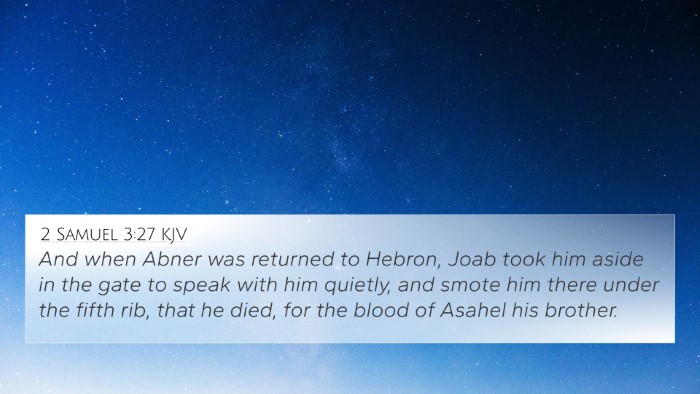Understanding 1 Chronicles 11:6
1 Chronicles 11:6 reads: “And David said, 'Whoever strikes the Jebusites first shall be chief and commander.' And Joab the son of Zeruiah went up first, so he became chief.” This verse signifies a pivotal moment in King David's journey to establish his rule over Israel.
Meaning and Context
This verse falls within the larger narrative of David's conquest of Jerusalem, emphasizing his leadership and strategic thinking. By offering a reward to the one who would first breach the Jebusite defenses, David motivated his men and stirred their competitive spirit. This act underscores the themes of valor, leadership, and the establishment of authority in the pursuit of a greater cause.
Combined Insights from Public Domain Commentaries
Matthew Henry: Henry points out that David's valuable leadership trait is shown when he encourages his troops to act bravely. His declaration serves as an invitation to honor and glory, showcasing how leaders can inspire action among their followers.
Albert Barnes: Barnes highlights the militaristic context of this verse, noting that it reflects the fierce nature of the times and indicates a strategy for warfare. By promising the chief position to the one who strikes the Jebusites first, David not only motivates his men but also demonstrates a pragmatic approach to leadership.
Adam Clarke: Clarke emphasizes the significance of Joab's action and David's acknowledgment. Joab, acting on the command, seizes the opportunity to gain favor, showing loyalty and courage. This determination not only aids in military victory but also solidifies his status among David's inner circle.
Thematic Connections
This verse reflects broader scriptural themes related to leadership, courage, and divine guidance in battle:
- Leadership and Valor: The characteristics of effective leaders are mirrored in David's approach.
- God's Favor: David’s choice of Jerusalem as the capital symbolizes God's chosen place among His people.
- Covenant and Nation Building: David uniting the tribes under his authority emphasizes the importance of collective identity.
Bible Verse Cross-References
1 Chronicles 11:6 can be cross-referenced with the following verses:
- 2 Samuel 5:6: Similar narrative of David capturing Jerusalem.
- 1 Chronicles 12:1-2: Lists of warriors who joined David, showing the loyalty of his men.
- Psalm 51:17: David exemplifies true leadership humility which God desires.
- Exodus 17:14-16: God’s instructions in battle highlight His guidance to leaders.
- 1 Timothy 3:1: Reflection on the noble aspiration of church leadership.
- 2 Samuel 23:8: Details the mighty men of David, showcasing valiant actions.
- Hebrews 11:32-34: Acknowledgement of those who fought for faith.
Inter-Biblical Dialogue
This verse opens dialogues between the Old and New Testament regarding leadership qualities and divine favor:
- David and the Apostle Paul: Both figures display qualities of steadfastness and humility in leadership.
- Jesus' Leadership Model: Parallels can be drawn between David's assertion of leadership and Jesus serving His disciples.
Tools for Cross-Referencing Bible Verses
Understanding verses like 1 Chronicles 11:6 benefits from the use of specific tools:
- Utilizing a Bible concordance allows users to locate patterns and themes.
- A cross-reference Bible study provides an in-depth exploration of interrelated verses.
- Comprehensive cross-reference materials enable a rich understanding of thematic connections.
Conclusion
1 Chronicles 11:6 presents more than a historical account; it serves as a window into the nature of Godly leadership and the dynamics within David’s command. Its themes resonate through both the Old and New Testament, shedding light on the consistent qualities that define God's appointed leaders throughout biblical history.
This exploration invites readers to consider not only the content of Scripture but also the ways in which verses intersect and illuminate greater truths within the biblical narrative.








